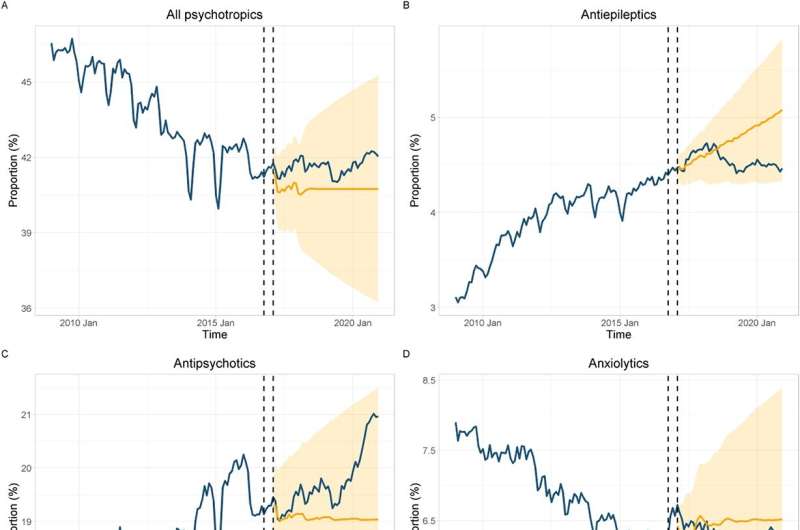This article has been reviewed according to Science X's editorial process and policies. Editors have highlighted the following attributes while ensuring the content's credibility:
fact-checked
peer-reviewed publication
trusted source
proofread
Trends in the use of psychotropics in older people with dementia

A recent register-based study has examined the impact of Finland's revised clinical guidelines for the treatment of dementia, published in 2017, on the trend of users of psychotropics in older people with dementia in 2009–2020. The work is published in the journal Age and Ageing.
Conducted at the University of Eastern Finland, the study found that the revised clinical guidelines did not reduce the use of psychotropics in the treatment of behavioral symptoms, despite a recommendation to avoid psychotropics. However, there was a slight reduction in the number of new users of psychotropics.
"The findings suggest that the guidelines were most often followed in situations that involved the initiation of a new medication rather than in situations involving abandoning an existing one," Researcher Mervi Rantsi of the University of Eastern Finland says.
Effectiveness assessment regarding the implementation of the national clinical guidelines is hampered by the lack of a control group, and awareness of new guidelines also tends to spread gradually. Other concurrent societal changes, such as changes in medication prices or reimbursements, also make it more difficult to assess effectiveness.
According to the Finland's revised clinical guidelines for dementia, behavioral symptoms associated with dementia should primarily be treated non-pharmacologically, and the use of psychotropics should be avoided. Effective non-pharmacotherapeutic options include, e.g., changes in health care professionals' communication to better accommodate the needs of patients with dementia, as well as music therapy. The objective of Finland's clinical guidelines for dementia is to disseminate information on evidence-based treatments and to improve the effectiveness of dementia treatment.
The register-based data included all anti-dementia medication purchases made by Finns 65 years of age or older in 2009–2020 (n= 217,778). The use of psychotropics was monitored before and after the publication of the revised clinical guidelines for dementia.
In 2009, anti-dementia medications were used by 43,750 people in Finland, and 57% of them used at least one psychotropic. The number of people using anti-dementia medications increased during the study. In 2020, anti-dementia medications were used by 105,683 people in Finland, and the 52% of them used psychotropics.
The dissemination of evidence-based information, i.e., the implementation of the clinical guidelines, has not been studied at population level in Finland before from the Finnish Prescription Register maintained by the Social Insurance Institution of Finland.
Clinical guidelines in other parts of the world, too, recommend avoidance of psychotropics in the treatment of dementia, but research into the effects of clinical guidelines on the use of psychotropics remains scarce, with conflicting findings and weak generalizability to the Finnish system.
The study was conducted in collaboration between researchers from the University of Eastern Finland and the Finnish Medicines Agency, Fimea. The study constitutes part of the MEDIFF research project. The MEDIFF project evaluates implementation strategies to promote rational use of medicines in older people.
According to previous studies and clinical guidelines, individual treatment paths and multi-professional collaboration between health care professionals involved the care of a patient with dementia play a key role in evidence-based treatment of behavioral symptoms.
"Further research is needed on the factors affecting prescription practices and the implementation of pharmacotherapy in accordance with clinical guidelines, as well as on the availability of non-pharmacological treatment options."
More information: Mervi Rantsi et al, Trends in the use of psychotropics in older people with dementia: interrupted time series of Finnish clinical guidelines of behavioural and psychological symptoms of dementia, Age and Ageing (2023). DOI: 10.1093/ageing/afad094




















